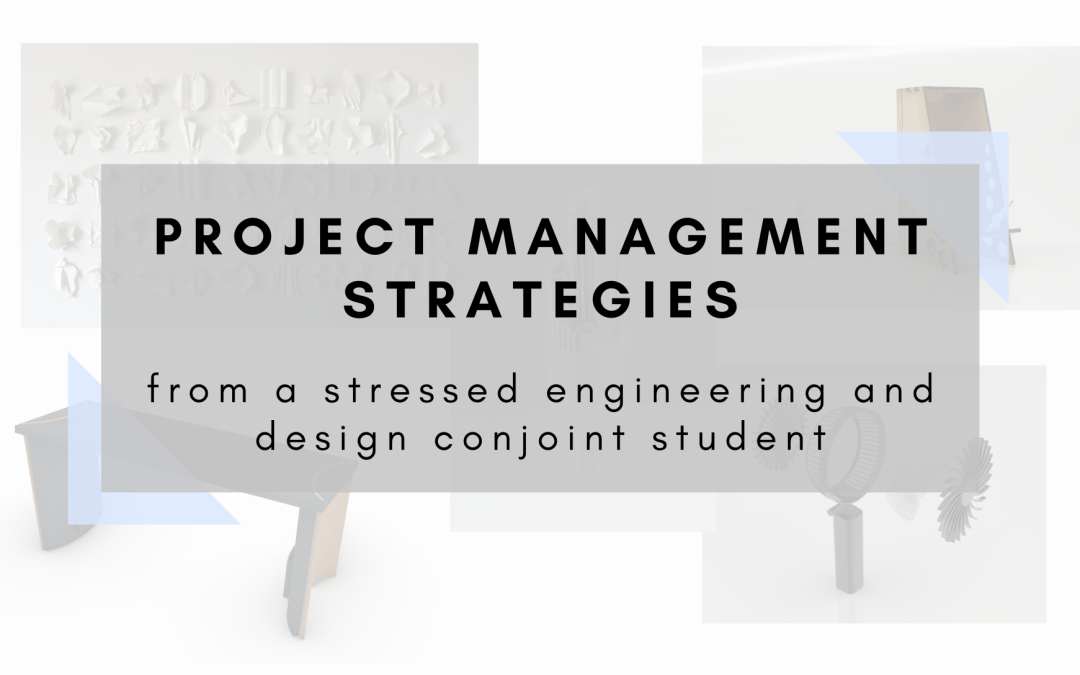For those of you who don’t know me, hi! My name is Sophia and I’m a Bachelor of Design/Bachelor of Engineering (Honours) conjoint student. Although I’m a second year university student, Semester 1 of 2022 was my first semester of design as well as my first semester in my chosen specialisation of Mechatronics. In that semester, I took two 2nd year engineering courses — MECHENG 235 and 242 — and two 1st year design courses — DESIGN 100 and 101. Having done both a full semester and a summer school term of university prior to this for my 1st year engineering papers, I was already familiar with the ins and outs of navigating Canvas, staying (mostly) on top of assignments and dealing with the impending doom of exams. So what did I find different or challenging about being in a conjoint for the first time?
The most significant difference I noticed, especially with doing a design conjoint, was the shift from short-term assignments to longer-term projects. I did about five major “long-term” projects this semester in both engineering and design:
- Two projects from MECHENG 235, the 1st one spanning 5 weeks and the 2nd 8 weeks
- One project from DESIGN 100, spanning about 8 weeks
- Two major assignments from DESIGN 101, each spanning 4 weeks

Some photos of projects I completed in my first semester of design!
Not only were these projects carried out over much longer periods than I was used to from high school or 1st year engineering, they also constituted a rather large portion of my grades. As much as I enjoy project-based learning, especially when I get the chance to design and be creative, I definitely faced some challenges with working towards these long-term deadlines. Through these challenges, I was able to learn some effective strategies that I’d like to share for anyone else struggling to manage longer-term projects, no matter what papers you’re taking!
Strategy No. 1: Time Management
Yes, I know this one may seem obvious: if you’re managing a lot of projects and deadlines at once, getting good at managing the time you spend on each project is an extremely useful skill. However, one lesser-known strategy for managing time that I absolutely love is time blocking: setting aside large “chunks” of time (eg. an hour or two — you could even use a timer) to dedicate to one project/class/etc. Time blocking is also really effective for exam studying (I know that’s still months away, but never too early to start panicking about those, right?). With this strategy, you can also include some “buffer time” to maintain some flexibility while still staying on track, something I’ve found extremely useful with group projects!
Strategy No. 2: Crystal Clear Deadlines
If you’re dealing with longer-term projects, setting very clear deadlines and sub-deadlines is crucial for staying on top of the project and avoiding a last-minute crunch. In my final project for DESIGN 100, the project was graciously broken down for us into sub-tasks with their own strict deadlines, making it much easier to work on it sequentially over the 8-week period. This was, however, not the case for courses like MECHENG 235, where the breaking-down of projects was left up to us as individuals and groups. Thus, I learned very quickly that setting clear deadlines, each with their own sub-tasks, and making sure everyone involved is aware of these deadlines is extremely important for getting things done on time and minimising the stress you experience in the process.
Strategy No. 3: How To “Find” Motivation
If you’re struggling to find the motivation to just start a project, or perhaps a portion of it, set a ten minute timer and work on it for that long. That’s it. If you get in the groove of things, keep going! And if you don’t and you stop after ten minutes, you still did ten minutes of work (wayyy better than zero). I’ve found that if I just get started on a project early on, even if it just means writing down a single sentence, it makes it much easier to come back to in the future compared to not having done anything at all.
Through doing all of these projects, often simultaneously, I learned something very quickly: you won’t be able to put 100% effort into everything. As someone who likes to try their very best to produce high quality work as much as possible, it took me a while to come to terms with this realisation, especially when I didn’t feel proud of the work I was producing near the end of the semester. In the end, I learned the important skill of prioritising certain projects over others (eg. if it’s something I care a lot about, or if it’s worth a large portion of my grade) and making compromises where necessary, a skill I’ll definitely be working on for years to come!
